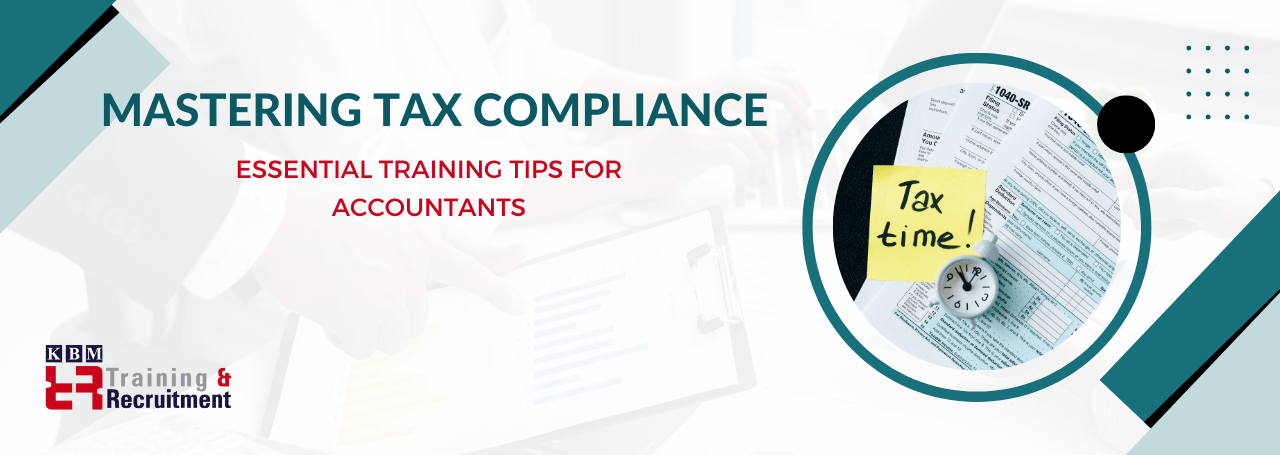Tax compliance is about more than just following the rules. For accountants, it's a superpower! By staying on top of tax regulations, they can assist businesses and individuals in saving money and ensuring their finances are accurate. It's a win-win for everyone.
Understanding Tax Compliance
Before delving into training tips, let's understand what tax compliance entails. Tax compliance refers to following tax laws, regulations, and filing requirements the government sets. It involves accurately calculating taxes owed, timely filing tax returns, maintaining proper documentation, and adhering to reporting standards.
Stay Updated with Tax Laws and Regulations
Tax laws and regulations are constantly changing. It makes it essential for accountants to stay updated with the latest changes. Here are some tips to help you stay informed:
- Regular Training Sessions: Participate in training sessions or seminars on tax laws and compliance updates. These sessions provide insights into new regulations, changes in tax rates, and compliance requirements.
- Utilise Online Resources: Take advantage of online resources like tax websites, newsletters, and webinars. These resources offer timely updates and explanations of complex tax issues, helping you stay abreast of changes.
- Join Professional Associations: Joining professional accounting associations can provide access to exclusive updates, resources, and networking opportunities. Associations often host events and webinars focused on tax compliance topics.
Leverage Technology Tools
Technology plays a crucial role in streamlining tax compliance processes and improving accuracy:
- Tax Software: Invest in reputable tax software that automates calculations, generates accurate reports, and ensures compliance with tax laws. These software solutions often include built-in checks and updates to stay compliant.
- Document Management Systems: Execute a document management system to securely organise and store tax-related documents. Cloud-based systems offer accessibility and backup capabilities, reducing the risk of data loss.
- Data Analytics: Use data analytics tools to analyse financial data, identify tax trends, and spot potential compliance issues. These tools can provide valuable insights for decision-making and proactive compliance measures.
Develop Strong Analytical Skills
Analytical skills are crucial for accountants dealing with tax compliance. Here's how you can enhance your analytical abilities:
- Critical Thinking: Develop critical thinking to evaluate tax implications, identify risks, and propose practical solutions. Critical thinking involves questioning assumptions, analysing data objectively, and considering alternative scenarios.
- Problem-Solving: Cultivate problem-solving skills to address complex tax issues and compliance challenges. Break down problems into manageable steps, gather relevant information, and apply analytical techniques to reach solutions.
- Attention to Detail: Pay attention to detail when analysing financial data, preparing tax documents, and reviewing compliance reports. Minor errors or omissions can lead to compliance issues, highlighting the importance of meticulousness.
Enhance Communication Skills
Effective communication is vital in tax compliance, especially with clients, colleagues, and regulatory authorities. Here are tips to develop your communication skills:
- Clear and Concise Messaging: Share tax information clearly and avoid confusing words or technical terms. Explain complex ideas using easy language for clients or stakeholders.
- Active Listening: Practice active listening when engaging with clients or colleagues. Listen attentively to their concerns, questions, and feedback, and respond appropriately to ensure mutual understanding.
- Collaboration: Collaborate with other professionals such as tax attorneys, financial advisors, and compliance specialists to address complex tax issues comprehensively. Working together well means talking clearly and respecting each other's knowledge.
Stay Organised and Maintain Documentation
Organisation and proper documentation are fundamental aspects of tax compliance. Here are tips to stay organised and maintain accurate records:
- Create Tax Filing Calendar: Develop a tax filing calendar outlining deadlines for various tax filings, including income tax returns, VAT returns, and payroll taxes. Adhere to the calendar to avoid late filings and penalties.
- Document Retention Policy: Establish a document retention policy specifying the types of tax-related documents, storage methods, and retention periods. Maintain organised records for audits, compliance checks, and reference purposes.
- Backup and Security: Implement robust backup procedures and security measures for tax-related data. Use secure storage solutions, encryption, and access controls to secure sensitive information from unauthorised access or data loss.
Continuous Learning and Professional Development
Continuous learning is significant for accountants to stay relevant. It expands their knowledge and enhances their expertise in tax compliance. Here are tips for continuous learning:
- Professional Certifications: Pursue professional certifications related to tax compliance, such as Certified Public Accountant (CPA), Chartered Tax Advisor (CTA), or Certified Management Accountant (CMA). These certifications validate your expertise and demonstrate commitment to professional development.
- Attend Workshops and Seminars: Attend workshops, seminars, and conferences on tax compliance, regulatory updates, and industry best practices. These events provide valuable insights, networking opportunities, and practical knowledge.
- Online Courses: Sign up for online courses or webinars that offer specialised training in tax compliance topics, such as international taxation, tax planning strategies, or digital tax trends. Online learning platforms provide flexibility and accessibility for professional development.
The Bottom Line
Mastering tax compliance requires technical knowledge, analytical skills, effective communication, and continuous learning. By staying updated with tax laws, leveraging technology tools, developing strong analytical and communication skills, maintaining organised records, and pursuing continuous professional development, accountants can explore the complexities of tax compliance with confidence and efficiency.






















